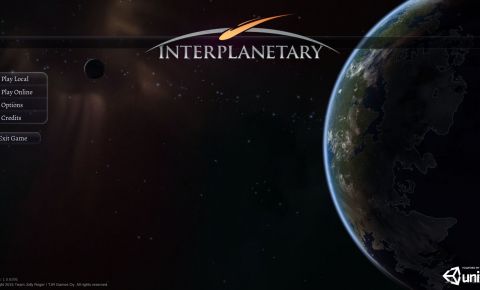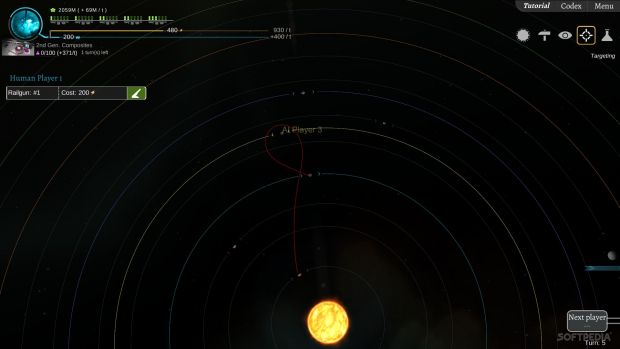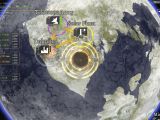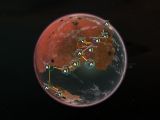Interplanetary is a video game which I tend to associate with a book I have recently read, called The Three Body Problem, because both of them deal with the unpredictable ways in which planets and stars move around each other and the effects that their combined gravity fields can have on the evolution of civilization.
The new title created by Team Jolly Roger asks the player to carefully judge distances and trajectories in order to conduct warfare between planets in a world where ships and invasions are not an option.
The book deals with the way a civilization would evolve if their star system were entirely unpredictable and often caused the utter destruction of life.
Interplanetary does not have the narrative depth of The Three Body Problem, but the video game does have one huge advantage over the novel: it gives players control and allows them to try and intuitively solve complex physics problems in order to cause massive damage on enemies.
Story
Interplanetary does not have any clear narrative thread, although there are some small clues included in the technology tree for the title and the codex that offers more details about the mechanics.
It seems that the world of the game is stuck with some advanced tech, but lacks the ability to create interstellar vessels, and that means the best way to engage in warfare between planets, all of them set in the same solar system, is to try and take them out with weapons that can be placed on the surface of a world.
Interplanetary does not feature too much story, but it is the kind of game experience that allows players to create their own narrative.
It would have been interesting to see the developers explore the effects of this kind of long-range combat on the population of each world, but this is a strategy title concerned with cold calculation rather than with human reactions and feelings.
Gameplay
Interplanetary is a game about near-misses, devastating strikes, and the complexity of movement inside a solar system.
It is also a turn-based strategy experience that asks gamers to manage resources, deploy buildings, explore new techs and decide how they want to use an array of powerful weapons.
Initially, the player has one solar plant and one mine, and they need to decide how to use them in clever ways to destroy all others present in the system.
The first move is to find a tech to research and then build a railgun, which can be used to fire a powerful projectile at any other planet.
Energy is depleted by actions and is refilled every turn, with no storage, while mater is consumed by most projects and has a limited total amount.
That first railgun seems like a powerful weapon, but it will most likely miss most of the time because gamers who seek to strike an enemy planet will need to have a keen eye and carefully estimate both orbital movement and gravitational effects.
Interplanetary does not supply any numbers about how the planets move, and everything needs to be based on observation and careful guesswork.
I was pretty sure that after a few test shots I would be able to use my railgun to actually strike an enemy planet and take out something important, but I quickly discovered that most of my shots were lost in space and never reached their intended targets.
Cities are also important, because their population decides research rate and they are targeted by enemy strikes, and as the game progresses, players will get access to an array of other buildings, including telescopes, defensive measures, and better weapons.
Missiles can be obtained relatively quickly and can be targeted, and the tech tree also features lasers, which are not affected by gravity.
All of this arsenal is almost useless without telescope arrays that can detect enemy buildings and allow the player to carefully target their strikes.
Counter-intelligence measures also become a necessity to protect cities and other buildings, and Interplanetary is the kind of title where players never have enough resources to solve all the problems they are dealing with.
“By the late game, Interplanetary also features super weapons and a variety of upgrades for all the other buildings that can be created on a planet.”
The core mechanics of the experience are all interesting, and each turn, gamers have to make tough and meaningful choices, as well as choose how to use their weapons as they try to destroy enemy targets.
But despite the elegance of the ideas, Interplanetary can sometimes feel dull and un-engaging, mainly because it's too hard to actually take out enemy structures.
A replay feature would have helped a lot because it would have made it easier to observe the movement of other planets and better plan attacks.
The AI also seems a little too capable when it comes to its use of railguns, and just a few well-placed shots can destroy infrastructure in ways that make a situation impossible to recover from.
Graphics and audio
Interplanetary is a video game that focuses more on gameplay than on looks, but the development team at Jully Roger has managed to create a title that delivers all the information a player needs and to make clear how his attacks are affecting the other planets.
The design of the interface is very clean and it's easy for gamers to take a look at the state of their own planet, get details about the events that just took place and then decide how they want to spend their resources and where to target their weapons.
Interplanetary is created using the Unity engine, which is very flexible in terms of the genres that it can cover.
The sound design in Interplanetary is not very impressive but is adequate to the theme of the title and the science fiction universe it seeks to portray.
Multiplayer
Interplanetary does feature a multiplayer mode that allows up to eight players to enjoy the title at the same time, but unfortunately, the lobby is at the moment relatively deserted, with a small number of other players waiting to find someone to battle.
Because of the turn-based nature of the title, I think it would have been a better idea for the developers to introduce a way for players to play it in the long term and at their convenience, maybe with one turn executed every day.
The Good
- Gravity influenced combat
- Interplay between surveillance and stealth
The Bad
- Gravity makes it too hard to strike enemies
- The pace is relatively slow
Conclusion
I like the way the development team has separated weapon systems from targeting and intelligence buildings, making it hard for players to get to a point where they have all the info they need to actually hit the targets they would like to.
The complex movement of planets and the difficulties they introduce for all kinds of attacks is also engaging initially.
But Interplanetary does not remain engaging in the long term, mainly because the game makes it too hard to actually hurt opponents, and the computer is too good a shot.
The game would have benefited from more testing and balancing and it might become very engaging after a few patches are applied, but at the moment, it will only appeal to very patient and physics-inclined gamers.
 14 DAY TRIAL //
14 DAY TRIAL // 






















